Two environmental groups are warning international buyers against purchasing timber products from Sarawak, claiming the current sustainable timber certification system has “critical cracks”.
In particular, the report co-published on Nov 15 by The Borneo Project and Bruno Manser Funds (BMF) singled out timber products from Samling Group over alleged unsustainable practices.
This includes conflicts between Samling and Sarawak’s indigenous communities and acts of environmental degradation throughout the years.
Despite the alleged repeated conflicts and unsustainable practices, the NGOs pointed out that Samling’s logging operations in Sarawak continue to be certified as “sustainable” by the government-endorsed Malaysian Timber Certification Scheme (MTCS).
“This allows Samling’s timber products to be sold on the international markets under the Programme for the Endorsement of Forest Certification (PEFC) green timber label.
“The report outlines in detail how Samling’s ongoing breach of certification standards continuously failed to result in adequate improvements, with very little consequence,” a statement released by the NGOs last week stated.
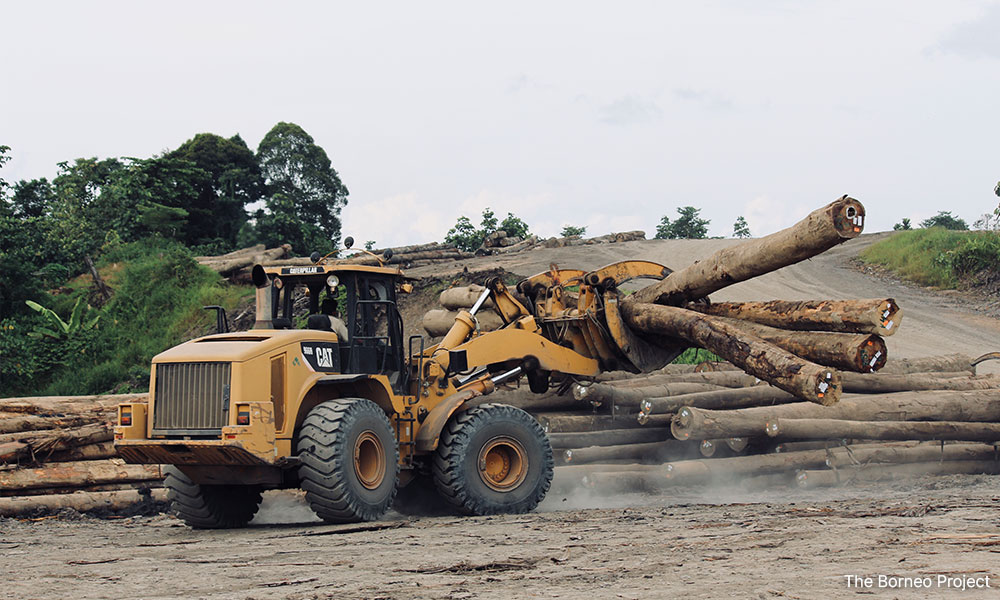
The Borneo Project executive director Jettie Word acknowledged that the Sarawak government was making real and concerted efforts to protect the state’s forests.
“But the way that MTCS is currently functioning simply cannot guarantee any of the standards they claim to uphold. The system needs to be reformed,” she added.
Therefore, the NGOs urged international buyers to avoid buying “high-risk” MTCS products and timber products from Sarawak.
The MTCS is an independent and voluntary certification scheme under the Malaysian Timber Certification Council (MTCC). At the international level, MTCS is recognised by PEFC.
PEFC is a global alliance of national forest certification systems.
Malaysiakini has reached out to the MTCC and auditing body Sirim QAS International to get their response.
Samling, meanwhile, said the allegations against it were “recycled” material which it had repeatedly addressed.
Alleged failure to obtain consent
In its report, The Borneo Project and BMF documented indigenous land rights conflicts involving 12 indigenous communities under Samling’s four Forest Management Units (FMU), namely the Gerenai, Layun, Ravenscourt, and Suling Selaan FMUs.
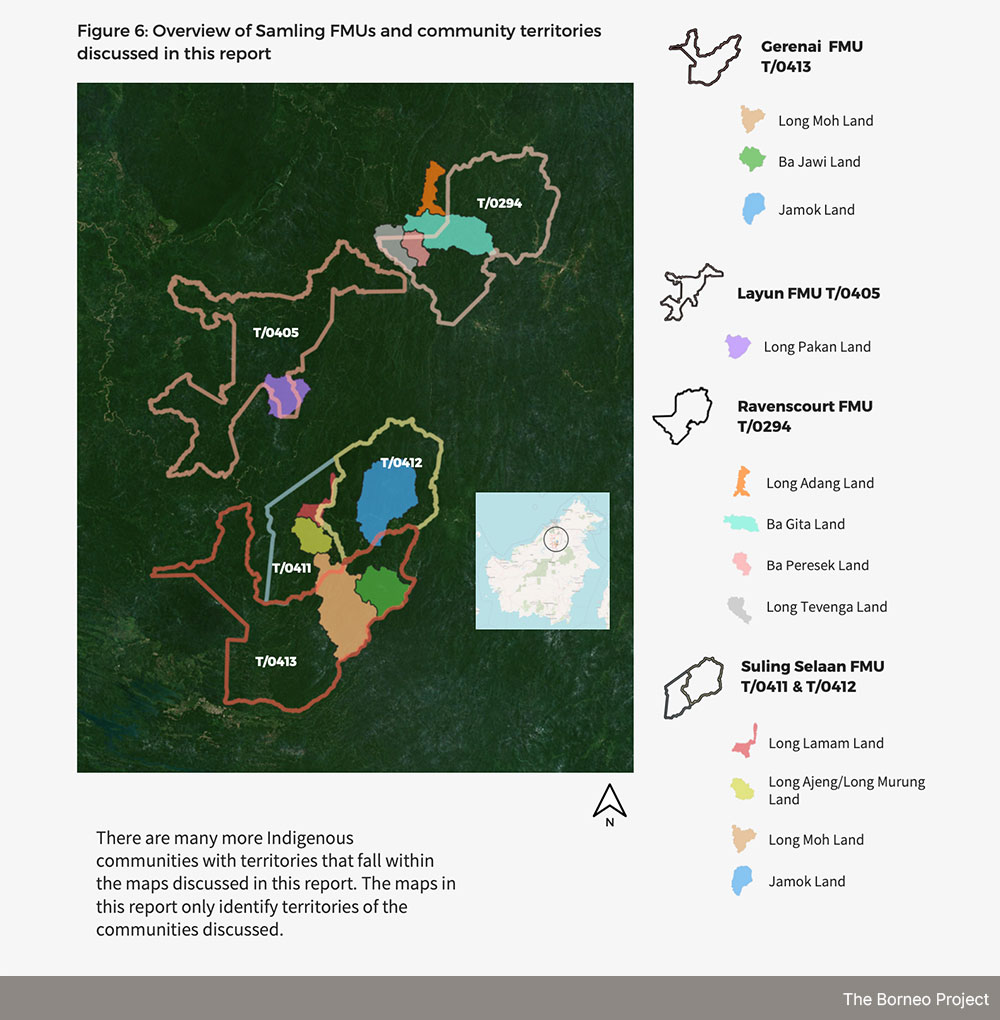
One issue raised by the report claimed that Samling failed to obtain the free, prior and informed consent (FPIC) of indigenous communities on logging.
Those communities included the Long Siut (Jamok land), the Long Tungan (Jamok land), those living on Ba Jawi land (Gerenai FMU), and the Long Pakan (Layun FMU).
This included a case involving the Kenyah community of Long Moh located within the Gerenai and Suling Selaan FMUs, in which Samling was accused of reneging on a verbal agreement not to log in areas such as Bekia, Ampai, and Seru’en.
Further, the report said areas such as Bekia and Batu Siman were ecologically as well as culturally sensitive areas which it alleged Samling encroached on.
In response to Malaysiakini’s queries, Samling said the issue of adequately obtaining FPIC was previously the main point of contention raised by Save Rivers - a Sarawak civil society organisation - against the company.
However, Samling said Save Rivers and its directors signed a joint statement with Samling, acknowledging that FPIC had been performed satisfactorily in accordance with the criteria of the MTCS scheme.
“We deem this issue as clarified and is a non-starter. We will not comment any further on this issue due to the settlement,” Samling said.
Likewise, on logging in the Bekia area, Samling replied they “will not comment any further on this issue” due to the settlement with Save Rivers.
Samling added that there were no unauthorised activities carried out in the Bekia area and all activities were done with consultation and consent of the local communities in the Bekia area.
On the alleged logging in Batu Siman, Samling refuted the claims.
“There is no area known as ‘Batu Siman’ to our knowledge. There is an area called Bukit Simang, which could be the area that was perhaps what was meant to be referred to.
“We can confirm that we have not operated or carried out any operations in Bukit Simang or its vicinity.”
“To our knowledge, the Bukit Simang area is not a culturally and ecologically sensitive area,” the company said.
Alleged land conversion for oil palm
Meanwhile, The Borneo Project and BMF report claimed that Samling was “in blatant contravention of the MTCS standards” by converting 47,859 hectares or 25 percent of the Gerenai FMU into oil palm plantations.
The limit allowed by MTCS standards is five percent.
Further, it alleged that in order to resolve the non-compliance, the area was excised from the scope of certification, despite it being within the full FMU.
The report cited an “anonymous industry contact” and claimed that the excised area would be converted into oil palm plantations and divided into 13 Provisional Leases for oil palm plantations.
“(The leases) have been given to companies with strong political ties, including four companies that are the land clearing operators for Samling Plywood (Miri).”
In response, Samling denied violating the five percent conversion limit.
The timber giant claimed the report had mistaken “areas that have been or are in the process of being issued by the authorities as provisional leases to independent third parties”.
“(The areas are) totally unrelated to Samling and we are not involved in the application of the provisional lease exercise.
“These areas have been excised out of the Gerenai Forest Timber License area (not from the FMU area),” it said.
Samling stressed that there are no plantations of any sort - oil palm or otherwise - either planned by or currently planted by Samling in the Gerenai FMU.
Alleged logging of planned wildlife sanctuary
Another allegation highlighted by the report was that Samling allegedly logged an area that was slated to become a wildlife sanctuary in the Sungai Moh area.
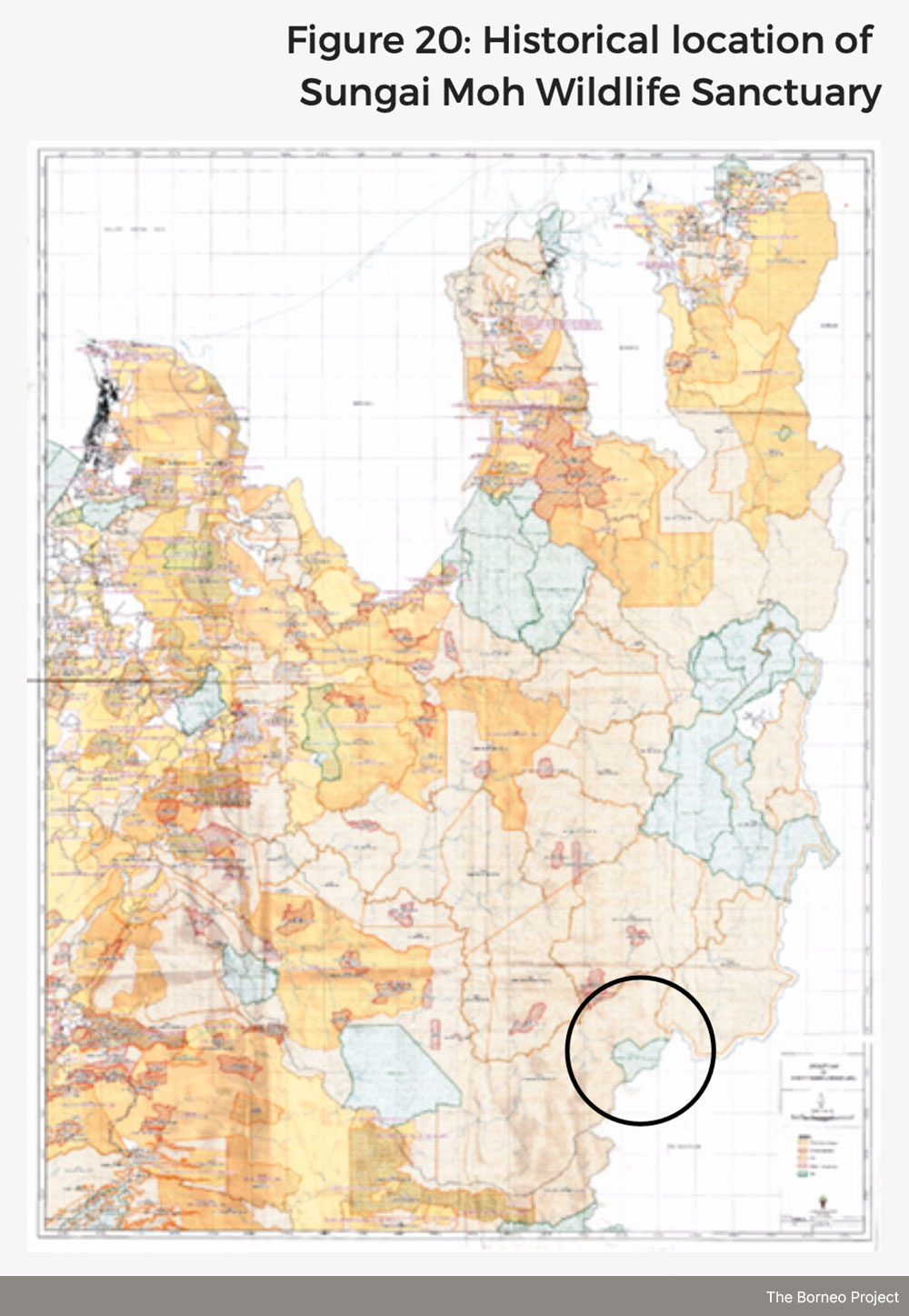
“The Sarawak government initially proposed the Sungai Moh Wildlife Sanctuary for an area in the northeastern part of what is today the Gerenai FMU, according to a map from the Forestry Department of Sarawak from 2010.
“Samling first began to construct a logging road into the proposed Sungai Moh Wildlife Sanctuary area in September 2010.
“By February 2014, Samling had logged the entire area of the proposed Sungai Moh Wildlife Sanctuary,” the Borneo Project and BMF’s report stated.
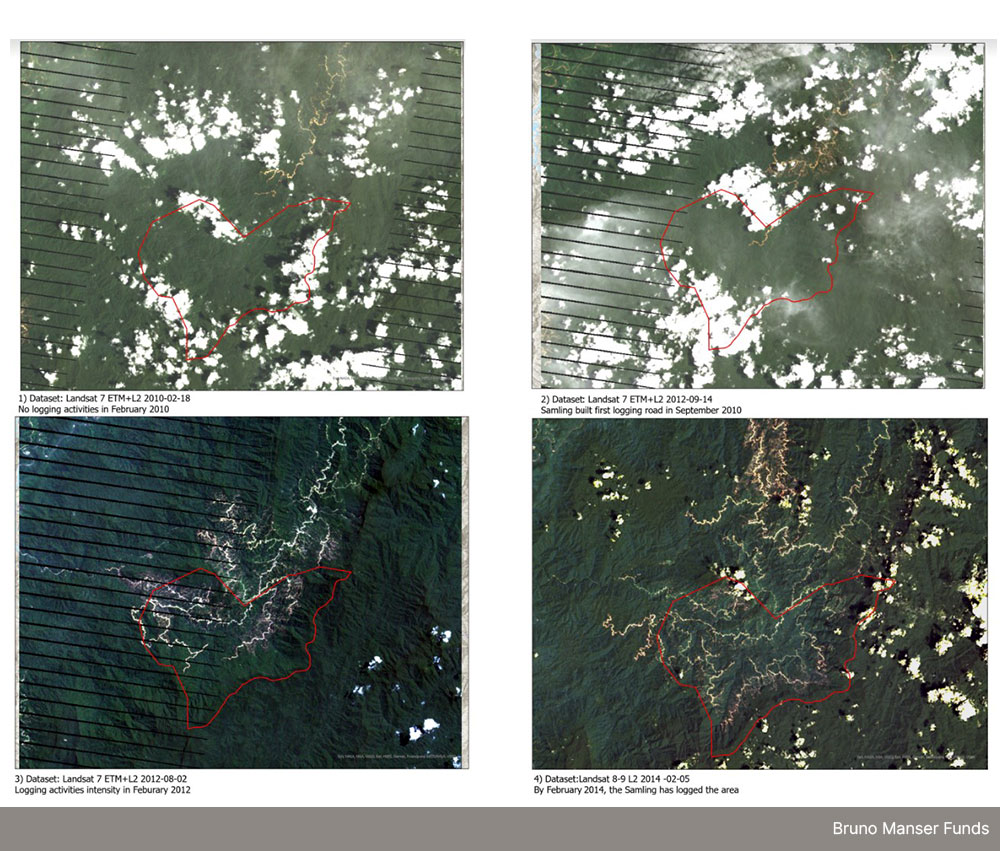
The NGOs discovered that the wildlife sanctuary was later moved southwest of the initial region according to a map of Samling’s Forest Management Plan for the Gerenai FMU from 2019.
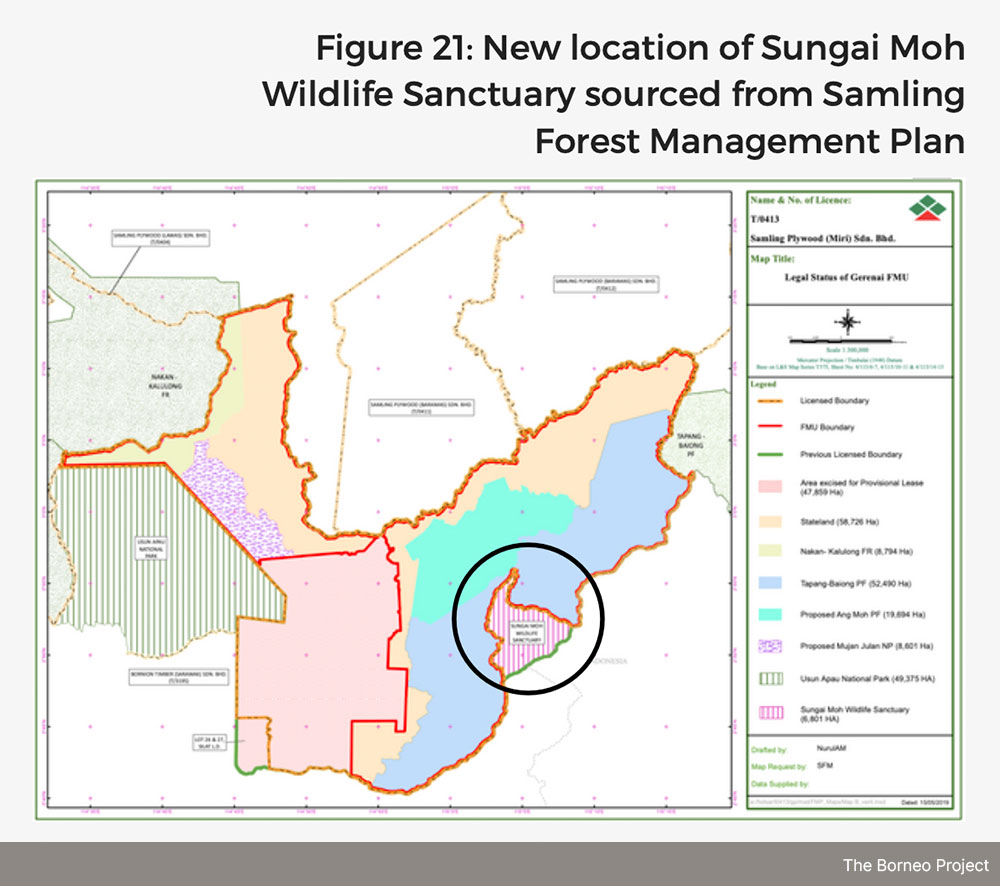
“Samling also built roads encroaching into the area of the new sanctuary location,” the report said, citing satellite imagery.
Samling denied it carried out any logging operations in any wildlife sanctuary.
“All our operations were carried out within our legally permitted licensed areas and with the full consent of the indigenous people living in the area.
“We can confirm the current proposed Sungai Moh Wildlife Sanctuary to this day remains pristine and untouched,” it said.
Malaysian Timber Certification Scheme
There are two levels of MTCS certification.
The FMU certification is at the upstream level and deals with the extraction of timber. The downstream certification Chain of Custody (COC) monitors the processing of timber and its products all the way to export.
In Peninsula Malaysia, the FMU certification is issued to forestry departments that manage the extraction of timber. While in Sabah and Sarawak, they are issued to forestry companies.
Besides limits to forest conversions and protection of ecologically sensitive areas, upholding indigenous community rights is a key criterion for MTCS certification.
In January this year, Sarawak Penans travelled to London to demand a halt on the import of MTCS-certified timber, claiming the so-called “sustainable” certification was merely a “greenwashing” scheme.
In July, the MTCC withdrew one of Samling’s certificates for the Ravenscourt FMU in Sarawak following complaints of violations. - Mkini



No comments:
Post a Comment
Note: Only a member of this blog may post a comment.